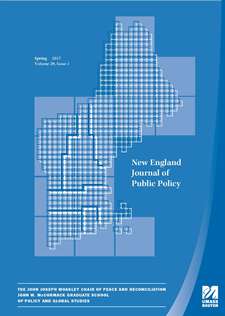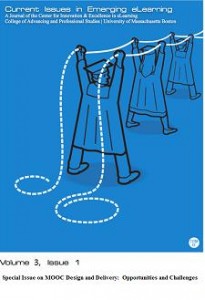 The most recent issue of the New England Journal of Public Policy is now available on ScholarWorks, the open access repository for scholarship and research at UMass Boston. The Special Issue is titled “Wealth, Power, and the Public Interest: Building Equity Culture and Civic Stewardship” and features eleven articles written by Marcy Murninghan.
The most recent issue of the New England Journal of Public Policy is now available on ScholarWorks, the open access repository for scholarship and research at UMass Boston. The Special Issue is titled “Wealth, Power, and the Public Interest: Building Equity Culture and Civic Stewardship” and features eleven articles written by Marcy Murninghan.
In his editor’s note for this issue, New England Journal of Public Policy founder and editor Padraig O’Malley writes about Murninghan’s work: “I have known Marcy Murninghan since the early 1980s when she worked for the late Robert Wood, once president of the Massachusetts University system, then superintendent of the Boston School System during the heyday of court-ordered desegregation. During this tumultuous period in Boston’s history, Murninghan played a significant role, tasked by Wood to plan and direct the structural organization of the department. Since then her career has taken many turns. She has churned out a plethora of reports and analyses for foundations, universities, the corporate world, and media monoliths. The result is a formidable body of work, from which the articles for this issue of the journal draws a tranche.”
And in her introduction to this issue, Murningham describes the articles selected for inclusion: “America faces a reckoning, a crucible of what Reinhold Niebuhr observed more than eighty years ago. Our democratic principles and traditions are imperiled by the power of financial oligarchs and unfettered money flows, which have contributed to massive inequality that, in turn, has given rise to political unrest and a sense of cultural unmooring. The articles presented here are both descriptive and normative, setting forth a complex social problem with seemingly bottomless proportions and then offering a design or set of remedial actions to alleviate them. Drawing on my professional experience going back to the mid-1970s, I wrote these pieces to generate new knowledge, new capabilities, and new vistas that open opportunities for growth and well-being—all the while knowing that no problems ever can be solved permanently and that sometimes solutions in one era become new problems in another.”
The New England Journal of Public Policy has been published since 1985 by the John W. McCormack Graduate School of Policy and Global Studies at the University of Massachusetts Boston. After folding in 2006 due to financial constraints, the New England Journal of Public Policy resumed publication in 2013 as an online, open access journal. Full issues of the entire run of the New England Journal of Public Policy are available on ScholarWorks.
Apart from Murninghan’s introduction and the editor’s note by O’Malley, who is also the John Joseph Moakley Distinguished Professor of Peace and Reconciliation at UMass Boston, the contents of this issue include:
- Money and Morality: Pathways toward a Civic Stewardship Ethic (2012) by Marcy Murninghan
- Corporate Civic Responsibility and the Ownership Agenda: Investing in the Public Good (1994) by Marcy Murninghan
- Undimmed by Human Tears: American Cities, Philanthropy, and the Civic Ideal (1992) by Marcy Murninghan
- Behind the Numbers: Conditions of Schooling in Boston (1981) by Marcy Murninghan
- Getting Power Back: Court Restoration of Executive Authority in Boston City Government (1985) by Marcy Murninghan
- The Accountability Web: Weaving Corporate Accountability and Interactive Technology (2010) by Marcy Murninghan
- The New Media, Globalization, and the Public Interest: A Conversation with Newton N. Minow (2003) by Marcy Murninghan
- Equity Culture and Decent Work: The Case of Amazon (2017) by Marcy Murninghan
- Improving Impact: Collaborative Multi-Party, Multi-Sector Engagement (2011) by Marcy Murninghan
- A Framework for Good Ownership and Good Governance (1999) by Marcy Murninghan
- Trusting Harvard: The Cost of Unprincipled Investing (2014) by Marcy Murninghan and Robert A.G. Monks
To view the full issue, and to explore back issues of this publication, click here.
ScholarWorks is the University of Massachusetts Boston’s online, open access institutional repository for scholarship and research. ScholarWorks serves as a publishing platform, a preservation service, and a showcase for the research and scholarly output of members of the UMass Boston community. ScholarWorks is a service of the Joseph P. Healey Library at UMass Boston.


